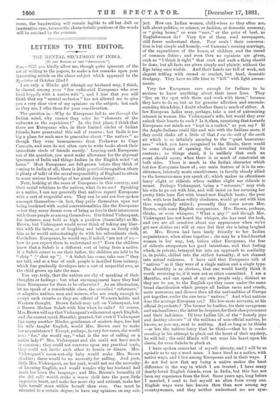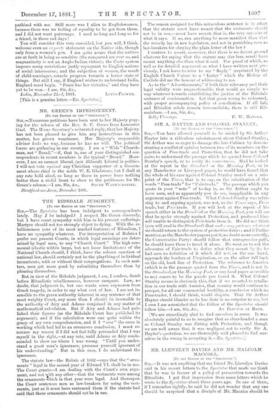LETTERS TO THE EDITOR.
THE MENTAL SECLUSION OF INDIA.
[To THE EDITOR OF THE " SPECTATOR.'] you kindly allow me, though quite ignorant of the art of writing to the papers, to make a few remarks upon your interesting article on the above subject which appeared in the Spectator of October 22nd ?
I am only a Hindu girl (though my husband may, I think, be classed among your " few cultivated Europeans who ever lived happily with a native wife "), and I fear that you will think that my " mental seclusion " has not allowed me to give you a very clear view of my opinions on the subject; but such as they are, I offer them for your consideration.
The question is,—Why do Europeans fail to see through, the Indian mind, why cannot they solve its " elements of the unknown or the capricious ?" In the first place, I think that there are Europeans who, in their limited circles of Indian friends, have penetrated this veil of reserve ; but India is too big a place for such men to generalise about " the natives " as though they were homogeneous from Peshawur to Cape Comorin, and men do not often care to write books about their immediate circle of friends merely.' Leaving such Europeans out of the question, you must make allowance for the abysmal ignorance of India and things Indian in the English mind " at home." Most Europeans are full-grown before they think of coming to India at all ; there is little practical recognition (there is plenty of talk) of the moral responsibility of England to attain to some serious knowledge of her great dependency.
Next, looking at the mass of Europeans in this country, and their social relations to the natives, what do we see ? Speaking as a native, I can say generally that natives regard Europeans with a sort of respectful awe. They can be and are free-spoken amongst themselves—in fact, they pride themselves upon not being burdened with social conventionalities like the Europeans —but they never dream even of being as free in their intercourse with those people as among themselves. Our friend Vishnupaut, for instance, may hold as high a position (financially) as Mr. Brown, but Vishnupant would never think of taking any liber- ties with the latter, or of laughing and talking as freely with him as he would unhesitatingly do with his subordinate clerk, Govindrao. Europeans, he would say, if asked, " are not of us,— how do you expect them to understand us ?" Even the children know that a Saheb is a different sort of being from a native. If a Saheb comes to see their father, the children are told to be " chap " [" shut up "]. " A Saheb has come, take care !" they are told, and so a fear of such people is instilled from infancy, which fear gradually developer into a sort of respectful awe, as the child grows up into the man.
You say, truly, that the natives are shy of speaking of their thoughts or feelings ; but what encouragement have they had from Europeans for them to be otherwise ? As an illustration, let me speak of a considerable class, the so-called " reformers," or adaptive natives, men and women, who are ready enough to accept such crumbs as they are offered of Western habits and Western thought. Brown Saheb may call on Vishnupant, but is Brown Madam Saheb with him when he calls ? Of course, Mrs. Brown will say that Vishnupant's wife cannot speak English,
and she cannot speak Marathi; granted, but even if Vishuupant like many another Hindoo gentleman of modern days, has had his wife taught English, would Mrs. Brown care to make her acquaintance ? Except, perhaps, in very few cases, she would not ; "for," she would say, "what is the use of calling on a native lady ?" Mrs. Vishnupant and she could not have much in common ; they could not converse upon any practical topic, they could not invite each other to tennis or dinner. Mrs. Vishnupant's cocoa-nut-oily baby would make Mrs. BrOwn shudder ; there would be no necessity for calling. And poor, little Mrs. Vishnupant, on her part, would not see the necessity of knowing English, and would wonder why her husband had made her learn the language ; and Mrs. Brown's formality (if she did call) would. strike a worse chill into the poor, little impulsive heart, and make her more shy and reticent, make her hide herself more within herself than ever. One must be educated to a certain degree, to have any opinions on any sub-
ject. How can Indian women, child-wives as they often are, talk about politics, or science, or fashion, or domestic economy, or " going home," or even " men," or the price of beef, as Englishwomen do ? Very few of them read newspapers, still fewer understand them. Poor souls ! their conversa- tion is but simple and homely,—of Yamuna's coming marriage, of the expenditure of the house, of children and the round of common duties ; and even then no opinions are given,. such as "I think it right" that such and such a thing should be done, but all facts are given simply and plainly, without the Ego being once visible. And their hands are full of work, not elegant trifling with crewel or crochet, but hard, domestic drudgery. They have no idle time to " kill" with light amuse- ments.
Very few Europeans care enough for Indians to be anxious to know anything about their inner lives. They "live on the spot with them and work with them," because they have to do so, but as for genuine affection and unconde- scending friendship, I doubt whether there is much of either. A few European ladies may, perhaps, take a sort of patronising interest in women like Vishnupant's wife, but would they ever unlock their hearts to such ? Is it, then, surprising that towards Europeans our minds are "kept in a casket," as you say ? If the Anglo-Indians could like and mix with the Indians more, if they could shake off a little of that I am the salt of the earth air which is so infinitely amusing to the " quiet humorous- ness " which you have recognised in the Hindu, there would be some chance of opening the casket and revealing its contents ; as things stand, it is unlikely that such an event should occur, when there is so much of constraint on both sides. There is much in the Indian character which but few Europeans know of ; one main feature of it is its sen- sitiveness, intensely acute sensitiveness (a faculty closely allied to the humorousness you speak of), which makes us oftentimes fancy slight or ridicule where neither slight nor ridicule is- meant. Perhaps Vishnupant, being a " reformer," may wish his wife to go out with him, and will insist on her covering her pretty little bare red with brand-new English boots ; the poor wife, with true Indian-wifely obedience, would go out with him thus compositely attired; presently they come across Mrs. Brown, with some English companions. Mrs. Brown, perhaps,. thinks, or even whispers, " What a guy !" and though Mrs. Vishnupant has not heard the whisper, she has read the look, and (we are all sensitive about our appearance when we've got new clothes on) will at once feel that she is being laughed at. Mrs. Brown had been fairly friendly to her Indian acquaintance, when alone together ; she may be a kind-hearted woman in her way, but, before other Europeans, the fear of ridicule overpowers her good intentions, and that feeling which, in private, betrayed her into an approach to cordiality is, in public, chilled into the stiffest formality, if not shamed into actual rudeness. I have said that Europeans talk of " natives " as if they were of a single nation and a single type. The absurdity is so obvious, that one would hardly think it• worth recurring to, if it were not so often committed. I am a Maratha, and can speak of my own people only ; distinct as they are to me, to the English eye they come under the same broad classification which groups all Indian races and creeds, more numerous and diverse than all the nationalities of Europe put together, under the one term " natives." And what natives does the average European see ? His low-caste servants, or his official dependents ? The former he loathes, for their savageness and uncleanliness; the latter he despises, for their obsequiousness and their indolence. Of true Indian life, of the " homely joys and destiny obscure " of the millions of non-official natives, he knows, as you say, next to nothing. And so long as he thinks —or lets the natives fancy that he thinks—that he is conde- scending in his attempt to pluck out the heart of their mystery,. he will fail ; the mild Hindu will not wear his heart upon his sleeve, for even Sahebs to pluck at.
I have spoken somewhat of myself already, and I will be so- egoistic as to say a word more. I have lived as a native, with native ways, and I live among Europeans and in their ways. I do not feel now that my being a native makes the least difference in the way in which I am treated ; I have many dearly-loved English friends, even in India, but this has not been my experience from the first. Some years ago, long before I married, I used to feel myself an alien from every one.
English ways were less known then than now among my countrywomen, and they neither understood me nor sym- pathised with me. Still more was I alien to Englishwomen, because there was no feeling of equality to be got from them, and I did not want patronage. I used to long and long so for a friend, in those sad days !
You will consider this very one-sided, but you will, I think, welcome even au ex, parte statement on the Native side, though only from a woman's pen. I am quite aware that the natives are at fault in being so sensitive (the conquered are ever so, and magnanimity is not an Anglo-Indian virtue); the Caste system imposes many restrictions justly repugnant to English notions of social intercourse ; and the subjection of women, the result of child-marriages, retards progress towards a better state of things. But still I say, if England wishes to understand India, England must begin. " Peace has her victories," and they have yet to be won.—I am, Sir, &c.,











































 Previous page
Previous page